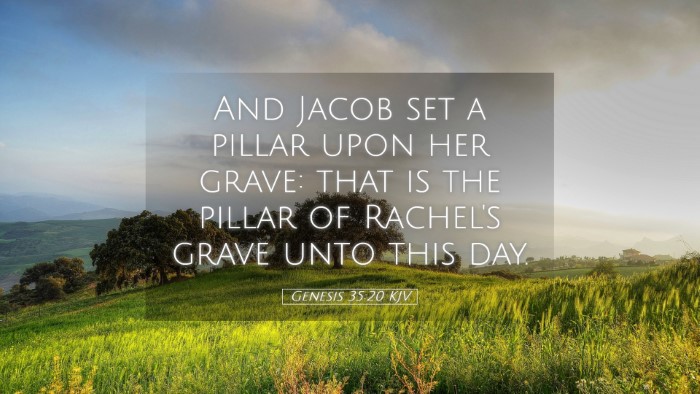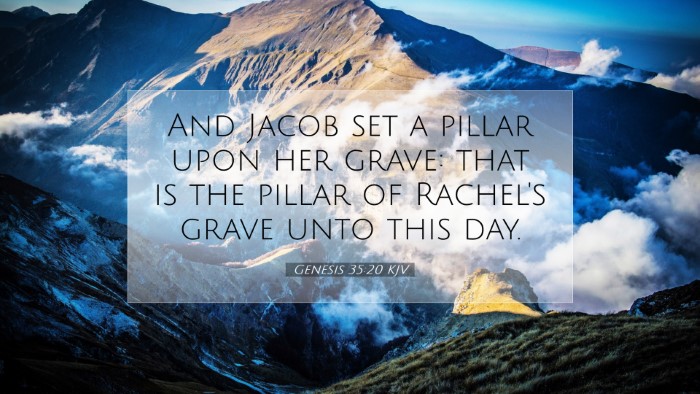Commentary on Genesis 35:20
Verse: "And Jacob set a pillar upon her grave: that is the pillar of Rachel's grave unto this day." (Genesis 35:20)
Introduction
This passage is a poignant moment in the biblical narrative, reflecting themes of loss, remembrance, and divine providence. Rachel, beloved wife of Jacob, dies during childbirth, and her grave becomes a significant marker in the patriarch’s life. The act of setting a pillar over her grave symbolizes Jacob's love and the importance of memory in the covenantal history of Israel.
Historical Context
According to traditional understanding, Rachel died while giving birth to Benjamin, the youngest son of Jacob (Genesis 35:18). The mention of Rachel's grave indicates the geographical and symbolic importance of this location, near Bethlehem. This narrative emphasizes the personal losses faced by biblical figures and reflects broader themes of struggle and providence in God’s plan.
Thematic Analysis
-
Symbolism of the Pillar:
The pillar Jacob sets up serves multiple symbolic purposes. It represents a memorial of Rachel’s life and legacy. Commentators note that such acts of setting memorial stones were not uncommon in the ancient Near East and served to commemorate significant events or individuals.
-
Grief and Mourning:
This moment captures a deep sense of loss. Jacob’s action emphasizes the human experience of mourning. Matthew Henry comments on the importance of expressing grief and honoring those we love. Jacob’s pillar serves as a tangible reminder of Rachel's memory, sustaining the emotional weight of his loss.
-
Covenantal Significance:
Rachel’s death occurs during a pivotal time in Jacob's narrative: his return to Canaan after years of exile. Albert Barnes notes that this transitional period highlights God’s ongoing covenant with Jacob and his descendants. Rachel’s death signifies not just personal loss but also the ongoing covenant dynamics amidst family struggles and divine promises.
Commentary Insights
-
Matthew Henry:
Henry emphasizes the tragedy of Rachel’s death and how it poignantly fits into the overall narrative of Jacob's life. He notes that the pillar is significant, representing God's faithfulness even amid sorrow. He discusses how this event serves to highlight the trials that accompany divine blessing and the pain of separation that marks human relationships.
-
Albert Barnes:
Barnes offers insight into the geographical location of Rachel's grave, describing it as a key feature of the land and its history. He suggests that the grave’s prominence in Israel's narrative underscores a deeper theological implication – the recognition of maternal sacrifice and its lasting impact on future generations.
-
Adam Clarke:
Clarke focuses on the broader implications of Rachel’s death within the context of family and motherhood. He relates Jacob's pillar to the need for remembrance and the acknowledgment of grief within families. He also interprets the grave as a reminder of God’s continual involvement with His chosen people, signifying a place of both sorrow and hope.
Application for Today
The memorialization of Rachel invites contemporary readers to reflect on the importance of memory, legacy, and mourning in their own lives. For pastors and theologians, this verse can serve as a basis for discussions about how loss shapes our faith journey and how we remember those who have had a significant impact on our lives and community.
Further, it highlights the promise of God even amidst despair, urging believers to recognize the lasting effects of love and faithfulness in relationships. The commemoration of Rachel encourages an understanding of the interconnectedness of grief, memory, and divine assurance within the believer’s life.
Conclusion
Genesis 35:20 encapsulates significant themes pertinent to the human experience—love, loss, memory, and the enduring nature of God’s covenant. By studying the commentary of scholars like Matthew Henry, Albert Barnes, and Adam Clarke, one gains a richer perspective on the text, encouraging reflection that resonates across generations.


